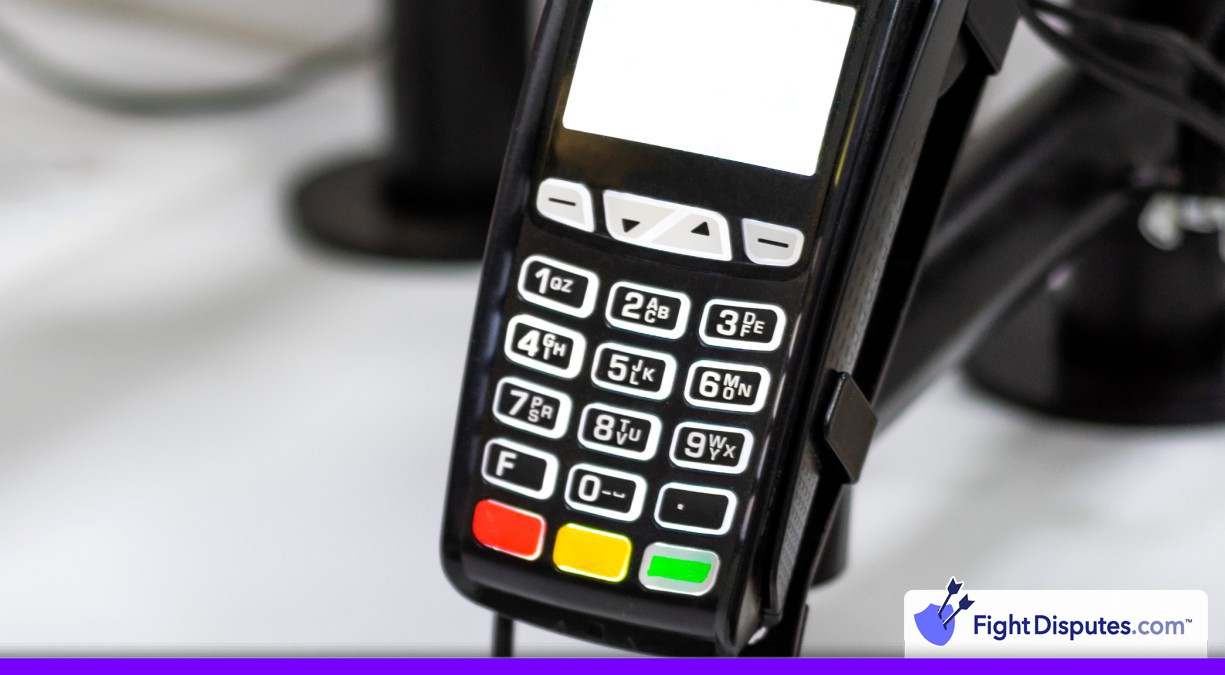EX: Expired Card
EX is a Discover chargeback code. Payment processors are actually built to automatically reject expired cards – that’s just how they work. Sadly, merchants still wind up with expensive EX chargebacks when these transactions somehow get through. What makes these disputes frustrating is that they fall completely on the merchant. The system should have caught and blocked that expired card long before any payment went through.
Most EX chargebacks happen because of technical problems or process failures somewhere in the merchant’s operation. Discover usually sides with cardholders in these cases, and to be fair, it makes sense – processing an expired card is a basic mistake that’s hard to argue against. What’s painful about these preventable errors is that they use up resources and energy that merchants could be putting toward actual fraud cases instead.
Every single EX chargeback tells payment processors that your setup has operational problems. Higher processing fees or account restrictions will usually follow. The financial damage goes well past the original transaction amount, as chargeback fees and extra processing penalties add up on top of everything else.
The process behind these authorization failures shows where merchant systems are breaking down and hurting chargeback prevention work.
How It Works
If a merchant runs a charge on an expired card, they’ve already made a big mistake. Payment systems are designed to catch expired cards and decline them automatically before any money changes hands – this usually works just like it should. But every now and then, merchants will override the system and force these transactions through anyway, or their equipment just fails to catch the expired date.
The bigger problems start when the cardholder gets their monthly statement and sees a charge on a card they haven’t used in months. They’ll call Discover, asking how in the world money got pulled from a card that should have been inactive.
When Discover pulls up the transaction facts, the rep can obviously see that the merchant somehow ran the charge well after the expiration date that’s printed right there on the front of the card.
At this point, the cardholder doesn’t have to go through any steps to prove fraud or argue about whether the charge was real. They just need to point out that their card had already expired when the merchant decided to run the charge. Discover looks at the dates and files a chargeback with the EX code and pulls that money back from the merchant’s account. This whole situation usually takes about 60 to 90 days from when the original transaction happened. Most merchants have no idea at all that they made this mistake until that chargeback letter shows up in their mailbox, and by then, it’s too late to fix anything or try to save the sale.
Manual card entry is where most of these problems start. When employees have to type in the card numbers by hand, they might completely miss the expiration date or accidentally enter it incorrectly. Forced authorizations cause problems, too – that’s when merchants see a decline message but override it and push the transaction through anyway.
How it Affects Chargeback Prevention
A customer tries to pay with an expired card, and the transaction still goes through. Congratulations – you’ve just run into what’s called an EX chargeback. This chargeback will hit your business differently than common fraud disputes because the mistake is on your end. Discover and your payment processor will see it as an easy-to-avoid error that just shouldn’t happen when the right checks are in place.
The worst part about EX chargebacks is that you basically can’t win them. The liability lands on you, the merchant, because you processed a card that had already expired. There’s no defense you can build and no evidence you can collect to fight it. You accepted an expired card, and now you have to cover the entire loss.
These chargebacks also send a very bad signal to your acquirer about how well you manage your payment operations. Each EX chargeback tells them that either your authorization systems need some work or your terminals need an update. Get enough of these and you’ll start running into account restrictions or much higher processing fees.
The main frustration comes once you see just how you could have avoided this whole mess. A quick terminal update or a basic authorization check would have caught the expired date before the transaction ever went through. You’re now wasting time and money on a dispute that you can’t win, as your chargeback ratio takes an unnecessary hit.
Example Scenarios
Your cashier has a line of frustrated customers backed up during the lunch rush. A card gets declined. But the shopper says that there’s plenty of money in the account. Your employee wants to help, so they override the system and force the sale through. Everything looks fine until 3 weeks later, when an EX chargeback letter shows up. The bank says that the card has expired. But you ran it anyway.
That manual override is one way a business can bring chargebacks on itself. Another mistake shows up all the time with subscription services that use old payment software – like those monthly box programs. The system tries to bill the cards without checking the expiration date. A customer’s card had expired 2 months ago. But the software doesn’t catch it. The charge goes through and gets reversed as an EX chargeback weeks later.
Network problems open up a third doorway to disputes. Your store might lose its internet connection during a storm, so you switch to offline mode to keep sales moving. In that mode, the system can’t check the card info right away. An expired card slips through because the authorization doesn’t happen until hours later. After you reconnect, the sale is set and on its way to becoming a chargeback.
Requirements and Timeframes
When Discover hits you with an EX chargeback, that 10-day countdown begins the second it lands. It’s a full 10 days to submit all the evidence. Miss that window, and it means that you’ll automatically lose (no exceptions and no extensions) even if the request is very polite.
The evidence laws can be pretty strict. Discover wants to see the proof of authorization, delivery confirmation, and every part of customer communication sitting in your files. But even with perfect paperwork, these disputes are nearly impossible to win. The reason is pretty simple – the transaction went through on an expired card. In Discover’s book, that’s game over from the start.
Payment systems need standard card checks to catch those expired cards before any charge is run. Most processors recommend looking over and refreshing the stored card info at least once a month. Wait much longer than that and you’re setting yourself up for problems once those expiration dates roll around.
PCI standards actually call for verifying the card info before running any transaction – and yes, that includes checking the expiration date as a step. Process an expired card anyway, and you break the merchant agreement. Those violation fees can wind up costing you a few times more than the original chargeback.
The best move is to build automatic alerts into the system about 60 days before any stored card hits its expiration date – this gives you time to contact the customers for updated payment info before their next subscription renews or scheduled payment comes due.
Frequently Asked Questions
Can merchants successfully dispute an EX chargeback?
When a customer files an EX chargeback you can still try to fight it through representment. The problem is that these are some of the toughest chargebacks to win because the mistake is usually obvious.
To have any actual shot at success, you need strong evidence on your side. You'd have to prove that the card was still valid at the time of the transaction. Maybe you have an authorization code that shows the bank approved it even though the card had already expired. Or maybe you have paperwork where the customer agreed to use a different card to pay.
Most merchants are usually losing these disputes anyway and it's not hard to see why. The expiration date is printed right there on the card and it's very hard to argue with something that obvious. Even if you do get an authorization code somehow, banks like to side with the customer anyway.
That's why prevention works way better than trying to fight these disputes after they happen. Update your payment systems so they automatically detect expired cards before processing them. Make sure to train your staff to check the expiration dates on each manual entry they manage. Set up automated alerts in your system that let customers know in advance when their cards are about to expire.
Think about the time that each option takes. You could spend a few hours to get together evidence and records and only lose the chargeback dispute anyway. Or you could use that same time to improve your checkout process and avoid the problem completely.
What evidence do merchants need for EX chargeback representment?
Discover has some very strict documentation laws for expired card disputes and they'll want to see just about every bit of evidence you can get together. Have your original sales receipt ready and any paperwork that shows the charge was authorized. On top of that you'll also need to show that the card was actually valid when the transaction took place. Include any emails, texts or other messages you exchanged with the cardholder about their payment - these types of communications can be helpful for your case.
The situation gets quite tough for merchants at this point. You're forced to prove 1 of 2 points - either that the card wasn't actually expired during processing or that you somehow had extra authorization to process an expired card anyway. That 2nd option is almost impossible to prove since most modern payment systems automatically decline expired cards during processing.
Merchants who collect every document and build a solid case still rarely win these disputes. The expiration date is printed right there on the physical card so it's very tough to argue against. I see merchants get frustrated with these cases quite a bit because the basic facts are so simple.
Instead of trying to win these disputes after they happen, the better move is to have prevention from the start. Always double-check the expiration dates during the transaction processing. Most payment terminals will automatically flag expired cards. Manual entry can sometimes bypass these built-in protections. Train your staff to verify the expiration date each time - even more so during manual card number entry.
How can recurring billing merchants prevent EX chargebacks?
An EX code from your payment system means that a customer tried to use an expired card - this error code works differently than the other Discover authorization errors that show up in your day-to-day reports. Codes like AT or DA usually point to authorization problems or compliance problems you'll need to look into and fix. With an EX code the story is easy - a customer just tried to run a transaction on a card that's already past its expiration date.
For subscription and recurring billing businesses expired cards can turn into a problem. Your customers might want to continue their service but they basically forget to update their payment info - and this happens all the time. The great news is that you can fix this problem before any revenue hit.
Account updater services can automatically refresh the card info. These services connect directly with the card networks to pull new expiration dates and card numbers whenever banks issue replacement cards so you still get paid and your customers never see any interruption.
Pre-expiration notifications work well as a part of your plan. Send your customers a friendly reminder about 2 weeks before the expiration date and then prompt them again a few days before your next billing attempt. Customers like the advance warning and will update their info faster.
Your retry logic needs some work too. Once the card comes back as expired stop trying to charge it. Repeated attempts use up your processing tries and can eventually upset your payment processor. It's better to contact the customer and ask them to update their payment info through email or text reminders.
Who bears liability for EX chargebacks?
Payment processing laws can seem confusing but they actually start to click once you see how the big card networks set up their whole system. The responsibility to catch fraudulent transactions and payment problems lands on the merchant and this setup usually works out well for everyone. Merchants get access to every tool and security system that they need to check card information before they process anything. Customers just want to buy what they're after without worrying about the checks that happen in the background.
Card networks have worked out a dispute timeline system that makes sense for everyone - they manage to give merchants and cardholders a fair opportunity to make their case whenever payment problems pop up. Merchants get the time to dig through their transaction records and pull together whatever documents they might need to defend themselves completely against any disputes. Cardholders also get enough time to go through their monthly statements and report anything that looks suspicious or just doesn't seem right to them.
One aspect that has improved quite a bit over the past few years is how smooth and automated the entire dispute process has become. The card networks have made it plain that they expect merchants to have solid fraud-prevention and verification procedures already in place and they're not budging on these laws that protect consumers and are also pushing businesses to buy better payment processing technology that can find and stop problem transactions before they turn into expensive chargebacks later.
The laws themselves look simple on paper, though you need input from those who are in the field and know the ins and outs of chargeback management and payment processing compliance to run the dispute process successfully and set up the right protective measures.
 Call (844) NO-DISPUTES
Call (844) NO-DISPUTES




